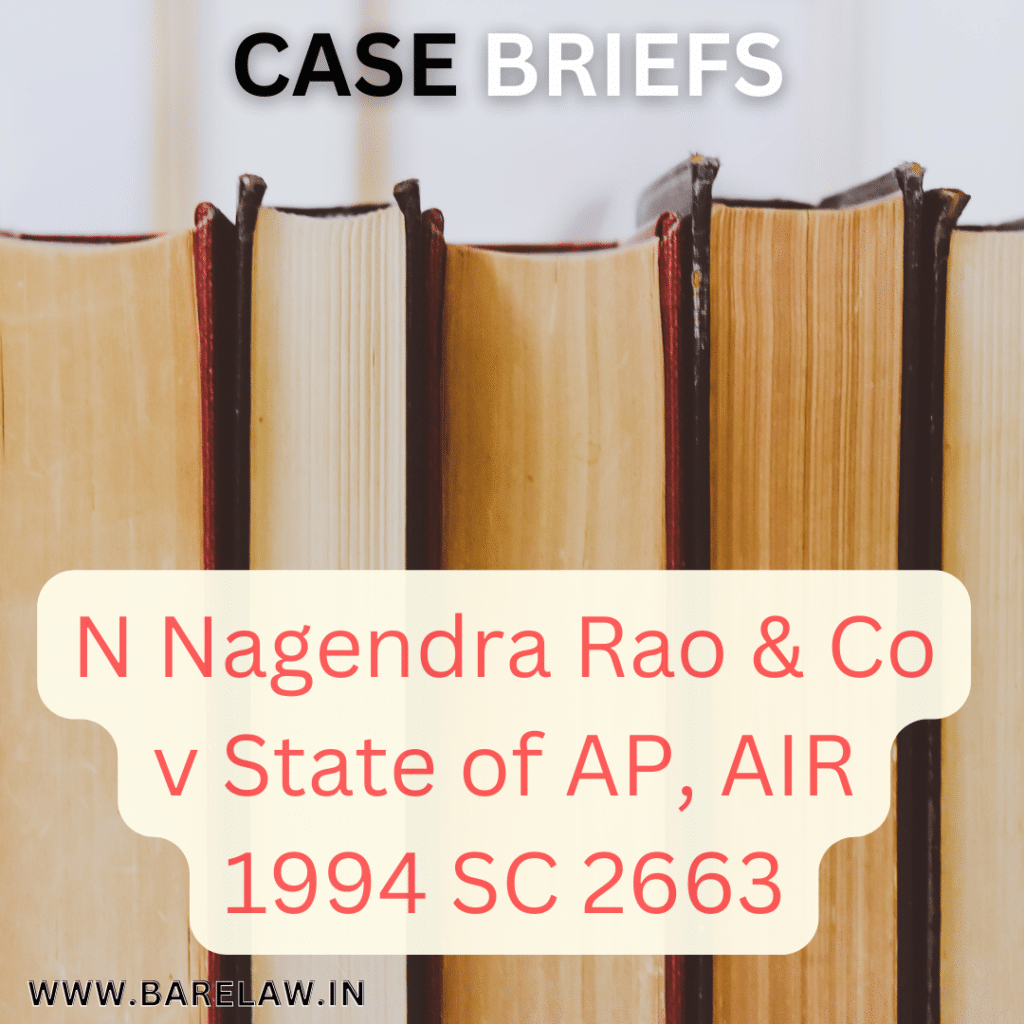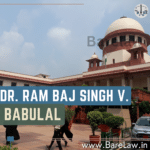
Case Name: N Nagendra Rao & Co v State of AP
Citation: AIR 1994 SC 2663
Court: Supreme Court of India
Judges: Kuldip Singh, Faizan Uddin, and B.P. Jeevan Reddy
Date of Decision: 10th May 1994
Brief Facts:
N. Nagendra Rao & Co. (“the appellant”) was a partnership firm carrying on the business of manufacturing and selling beedis in the state of Andhra Pradesh. The appellant challenged the levy of entry tax under the Andhra Pradesh Tax on Entry of Motor Vehicles into Local Areas Act, 1986 (“the Act”), which imposed a tax on the entry of goods into local areas for consumption, use or sale. The appellant contended that the levy of entry tax on goods which were transported by its own vehicles for consumption, use or sale within the state of Andhra Pradesh, was unconstitutional and violated their fundamental right to carry on trade or business under Article 19(1)(g) of the Constitution of India.
Issues:
Whether the imposition of entry tax on goods transported by the appellant’s own vehicles was violative of Article 301 and Article 304(a) of the Constitution of India.
Whether the imposition of entry tax violated the fundamental right of the appellant to carry on trade or business under Article 19(1)(g) of the Constitution of India.
Whether the imposition of entry tax amounted to double taxation.
Whether the levy of entry tax under the Act was discriminatory in nature.
Judgment:
The Supreme Court of India held that the imposition of entry tax on goods transported by the appellant’s own vehicles did not violate Article 301 or Article 304(a) of the Constitution of India. The Court held that the power of the state to levy taxes on the entry of goods into local areas for consumption, use or sale was within the ambit of Article 304(a), provided such taxes did not discriminate against goods from other states. The Court held that the imposition of entry tax did not amount to double taxation as the tax was levied on the entry of goods into the local area and not on the sale or purchase of goods.
The Court further held that the imposition of entry tax did not violate the fundamental right of the appellant to carry on trade or business under Article 19(1)(g) of the Constitution of India. The Court held that the appellant’s right to carry on trade or business was subject to reasonable restrictions, and the imposition of entry tax was a reasonable restriction on the appellant’s right to carry on trade or business.
Lastly, the Court held that the levy of entry tax under the Act was not discriminatory in nature, as it applied uniformly to all goods entering the local area for consumption, use or sale, irrespective of their place of origin.
Accordingly, the appeal was dismissed.
Summary:
The Supreme Court of India held that the imposition of entry tax on goods transported by the appellant’s own vehicles did not violate Article 301 or Article 304(a) of the Constitution of India. The Court held that the power of the state to levy taxes on the entry of goods into local areas for consumption, use or sale was within the ambit of Article 304(a), provided such taxes did not discriminate against goods from other states. The Court held that the imposition of entry tax did not amount to double taxation as the tax was levied on the entry of goods into the local area and not on the sale or purchase of goods.
The Court further held that the imposition of entry tax did not violate the fundamental right of the appellant to carry on trade or business under Article 19(1)(g) of the Constitution of India. The Court held that the appellant’s right to carry on trade or business was subject to reasonable restrictions, and the imposition of entry tax was a reasonable restriction on the appellant’s right to carry on trade or business.Lastly, the Court held that the levy of entry tax under the Act was not discriminatory in nature, as it applied uniformly to all goods entering the local area for consumption, use or sale, irrespective of their place of origin.





